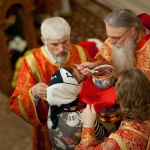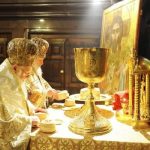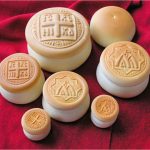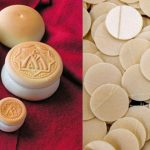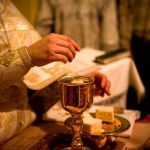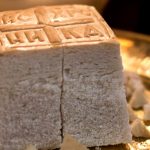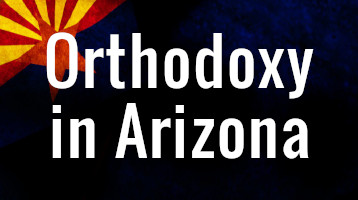by Abbot Tryphon Closed communion protects those who do not hold to the Church's teachings regarding the Holy Mysteries When a stranger approaches the Holy Gifts during the celebration of the Divine Liturgy it is the norm in the Orthodox Church for the priest to ask the person to "kiss the chalice". Not knowing if the person is Orthodox, or whether they are in good standing with the Church, the priest can not give them communion. This "closed communion" is not meant as a way of separating ourselves from visitors as though we were better than them, but as our way of guarding the Holy Mysteries from being received by someone who is not part of the Church and who may hold to views concerning … [Read more...]
How Serious Are Orthodox Bishops About The Eucharist?
GREEK ORTHODOX METROPOLIS OF DENVER May 1, 2018 Teleturgical Encyclical 29 The Pious Priests The Faithful Parish Members Holy Metropolis of Denver Beloved in the Lord, It has come to my attention that there are an increasing number of parishioners in some of our parishes who come forth to receive Holy Communion, but insist that the priest not give to them of the Body of Christ but only of His Blood. Those parishioners explain to their priests that their doctors -- obviously not Orthodox Christians — tell them not to eat any kind of bread because it will harm them. If there are Orthodox Christians in our parishes who believe that, after the Holy Spirit consecrates the Bread and … [Read more...]
Sacrament or Symbol?
What is the Lord's Supper? What is the Eucharist? Was it always understood as a Sacrament? Throughout the history of Christianity, the overwhelming majority of Christians have consistently believed that Jesus Christ, in a mystery, imparts His Body and Blood to His people though the vehicle of the Lord's Supper. Bypassing all the Biblical references, here is a small, non-exhaustive sampling of what they've had to say in every generation. If you're going to read any of them, please read them all. Ignatius of Antioch AD 35-107 "Mark ye those who hold strange doctrines touch the grace of Jesus which came to us, how they are contrary to the mind of God... They abstain from Eucharist and … [Read more...]
Eucharistic Bread: Leavened or Unleavened?
In the Bible, unleavened bread is called "unleavened bread," whereas leavened bread is simply called "bread." The Jews at that time would have understood this as would have the early Christians. It says that "He took bread," meaning leavened bread; and the Christians, being first instructed by the Apostles and then reading in the Gospels some time later, implemented this. At the Mystical Supper, it is obvious that our Lord was changing things, to tie the Passover meal with its fulfillment, the Eucharist. One of those changes, obviously, was using leavened bread instead of unleavened, or at least leavened in addition to unleavened. The world was empty and devoid of grace before Christ, as is … [Read more...]
Why the Seder?
Part three of our republishing of 'The Contemporary Protestant Seder: Anachronistic Revisionism?' by the Rev. Dr. Dcn. Timothy J. Wilkinson Why the Seder? Given the clear linkage between the Passover, the Seder meal, and the Eucharist – and the apparent lack of understanding of, or interest in this linkage – motives for participation in the Seder meal appear to fall into two categories. The first revolves around the well-known philo-Semitic evangelical desire for rootedness and connection with the early Church and its predecessor, the Jewish religion. Since the publication of Richard Foster’s Celebration of Discipline in 1978, ancient source literature, particularly as it relates to … [Read more...]
The Early Church, the Seder and the Eucharist
Part two of our republishing of 'The Contemporary Protestant Seder: Anachronistic Revisionism?' by the Rev. Dr. Dcn. Timothy J. Wilkinson. The Early Church, the Seder and the Eucharist What kind of meal was the Last Supper? At first blush it appears to be a Passover meal imbued with new meaning. In Matthew and Mark, Jesus specifically mentions the desire to eat the Passover meal with His disciples: Now on the first day of the Feast of Unleavened Bread the disciples came to Jesus, saying to Him, Where do You want us to prepare for You to eat the Passover? And He said, “Go into the city to a certain man, and say to him, ‘The Teacher says, “My time is at hand; I will keep the Passover at … [Read more...]
The Contemporary Protestant Seder: Anachronistic Revisionism?
by the Rev. Dcn. Dr. Timothy J. Wilkinson The protestant Evangelical world has, for many years now, appropriated the Jewish Seder service in an attempt to 'reconnect' with something more ancient, and I would contend, something more authentic. We offer this excellent piece by Dcn Tim Wilkinson, Reprinted (with permission) from Logos: A Journal of Eastern Christian Studies 56 (2015), published by the Metropolitan Andrey Sheptytsky Institute of Eastern Christian Studies, this article is being published in three installments, with endnotes included on the third installment. Introduction The Jewish Seder has become a routine part of contemporary Easter services in many American churches. … [Read more...]
Eucharist: Mystery or Memorial? Sacrament or Symbol?
What is the Lord's Supper? What is the Eucharist? Was it always understood as a Sacrament? Throughout the history of Christianity, the overwhelming majority of Christians have consistently believed that Jesus Christ, in a mystery, imparts His Body and Blood through the Eucharist to His people. Bypassing all the Biblical references, here is a small, non-exhaustive sampling of what they've had to say in every generation. If you're going to read any of them, please read them all. Ignatius of Antioch AD 35-107 "Mark ye those who hold strange doctrines touch the grace of Jesus which came to us, how they are contrary to the mind of God... They abstain from Eucharist and prayer, because they … [Read more...]
